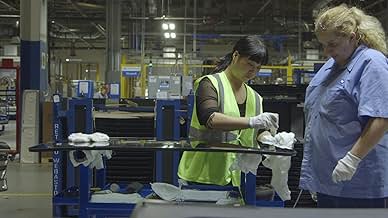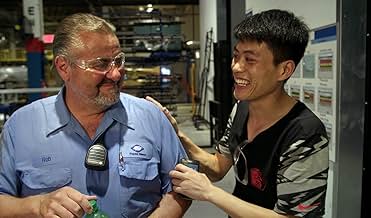अपनी भाषा में प्लॉट जोड़ेंIn post-industrial Ohio, a Chinese billionaire opens a factory in an abandoned General Motors plant, hiring two thousand Americans. Early days of hope and optimism give way to setbacks as hi... सभी पढ़ेंIn post-industrial Ohio, a Chinese billionaire opens a factory in an abandoned General Motors plant, hiring two thousand Americans. Early days of hope and optimism give way to setbacks as high-tech China clashes with working-class America.In post-industrial Ohio, a Chinese billionaire opens a factory in an abandoned General Motors plant, hiring two thousand Americans. Early days of hope and optimism give way to setbacks as high-tech China clashes with working-class America.
- 1 ऑस्कर जीते
- 19 जीत और कुल 50 नामांकन
- Self - Furnace Off-Loader
- (as Bobby)
फ़ीचर्ड समीक्षाएं
The Chinese management team that comes in doesn't always care about safety or the environment, but they're brutally efficient and drill their workers like an army or Communist party members, the latter of which is ironic, since the workers are so far from the ideals of communism, e.g. having real power and sharing the wealth of their labor. Meanwhile, one seriously wonders whether Americans can compete in this space, having been "spoiled" by prosperity and earlier times when they made a decent salary. You know, how dare they want a good work/life balance!
Where the documentary falls short is in not showing us the treatment of these workers under the American company beforehand; it really could have used a one hour segment on that. If it had taken the time to do so, we would have seen the same problematic behavior from American corporate executives squeezing every last drop out of their workers for the sake of the bottom line, ultimately leading to outsourcing manufacturing to overseas workers forced to work long hours, often away from their families.
The only effective means of worker power is through unionizing, and both Chinese and American executives resist it mightily, using pages from the exact same playbook, like targeting leaders and paying for propaganda campaigns. In a sense, the American executives going overseas was like finding a pool of scabs to cross the picket line. As one of the state congressmen observes in speaking to the workers, corporate profitability and treating workers respectfully via a living wage are not incompatible things, and it's shameful that they're treated that way out of unfettered greed in extreme capitalism. (Hmm, if only there was an international labor organization, lol)
It seems to me it's a system that spirals upon itself further - when you distribute the wealth so incredibly unfairly in a country, the vast majority of consumers can't afford to pay the premium for a product that was made by unionized hands. They often don't have the economic freedom to do that, or to do things like shop at a mom 'n' pop shop instead of some corporate goliath like Wal-Mart, because they're living paycheck to paycheck and every penny matters. The result is to further drive the system in the direction it's going. Suddenly the middle-class starts dwindling and people are hoping more for a miracle ala the lottery than thinking they can truly make it. The documentary doesn't mention any of this so I'm guilty of rambling on here, but it did make me think.
The ending sequence is sobering as well, showing management practically salivating over robotics taking the place of workers - you know, those pesky things on the payroll that do all of that complaining, sometimes get sick or pregnant, etc. Hey, we can drive costs down by just replacing them with machines! It's too bad no one asks any of the executives the difficult moral questions, like what the right thing to do is, or how they justify their behavior. Overall though, well done, and pretty chilling stuff.
At the Q&A at the premiere at IFC Center, co-director Julia Reichert was at pains to stress that the film was never meant to be polemical, that this was an effort to immerse and learn. While some of the silllier aspects of both cultures, (but especially the regimented and self-congratulatory aspects of the Chinese). come through with particular acuity, you can't help buy muse on how Americans have acted with equal tin-earedness and cultural arrogance around the world, over many more decades than the Chinese have been at this game.
At the same time, America's neediness of manufacturing jobs, even if they don't pay a living wage, and the ways that so many of what we would normally consider our core values go out the window to accommodate anyone who will invest in them, come through particularly clearly. This all comes together in a fight over the establishment of a union that would protect workers' rights and uphold our eroding safety and environmental standards that is the vivid core of the movie.
A final note: This film has an extraordinarily compelling musical score by someone names Chad Cannon that propels and highlights the narrative and is amazingly effective on its own terms. Although the idiom is different, Cannon's score does for this film much of what Philip Glass's have done over the years for the films of Errol Morris, and that is high praise indeed.
Hilarious because it's funny to see the culture clash between working class Americans and their Chinese counterparts (the Chinese CEO on a tour of his newly acquired American factory wants the fire alarm relocated because.....well, because it just looks bad). But depressing because it highlights the new global reality that many Americans just will not accept -- automation is eliminating entire sectors of workers around the world, and you can debate all day whether or not this is a good thing or a bad thing, but what's not up for update is that it's happening either way and those that can't adapt will be left behind.
This movie also reinforced something I've noted before, which is that if you take opposing ideologies to their furthest extremes, you eventually will meet in the same place. Conservative America is absolutely horrified at the slightest hint of socialism, let alone outright Communism, and tout capitalism as one of America's guiding principles. But the Chinese company in this film shows that capitalism taken to its monstrous extreme results in a culture that might as well exist in a Communist dictatorship, where allegiance to the company substitutes for allegiance to a political leader. And faced with that, what do working class Americans want? A dose of socialism to protect them from runaway corporate interests.
Grade: A-
For students who do not care about their education or their future, the best teacher in the world won't help. Apathy will destroy us far quicker than anything else.
क्या आपको पता है
- ट्रिवियाDirectors Steven Bognar and Julia Reichert previously worked on the short documentary The Last Truck: Closing of a GM Plant (2009). It is about how the plant was shut down by General Motors, a topic in this movie.
- भाव
Himself - Fuyao Safety Director: Everybody at every level will say that we really, really want to be safe. But safety doesn't pay the bills.
- कनेक्शनFeatured in The Oscars (2020)
टॉप पसंद
- How long is American Factory?Alexa द्वारा संचालित
विवरण
- रिलीज़ की तारीख़
- कंट्री ऑफ़ ओरिजिन
- आधिकारिक साइट
- भाषाएं
- इस रूप में भी जाना जाता है
- Công Xưởng Hoa Kỳ
- फ़िल्माने की जगहें
- उत्पादन कंपनियां
- IMDbPro पर और कंपनी क्रेडिट देखें
- चलने की अवधि1 घंटा 50 मिनट
- रंग
- ध्वनि मिश्रण
- पक्ष अनुपात
- 1.78 : 1
- 1.85 : 1
इस पेज में योगदान दें

































